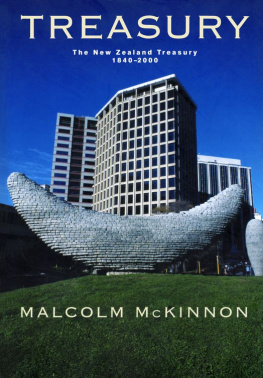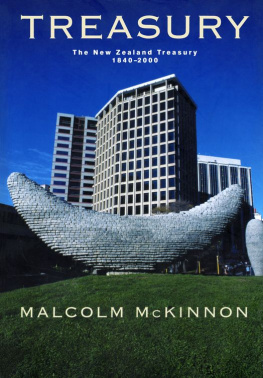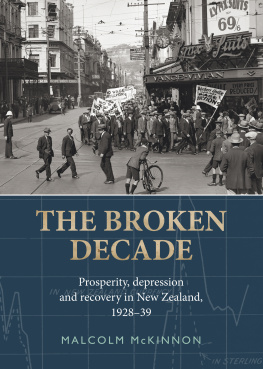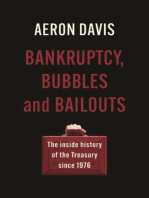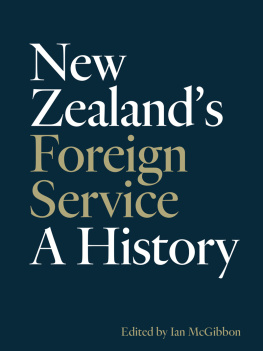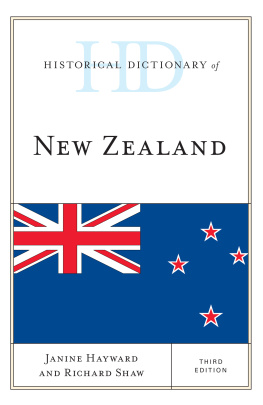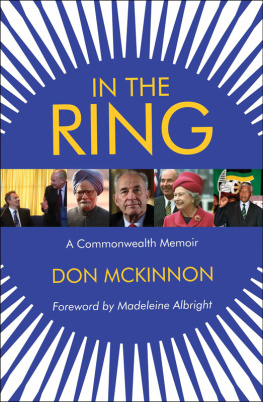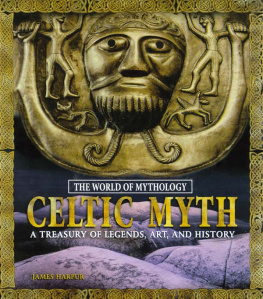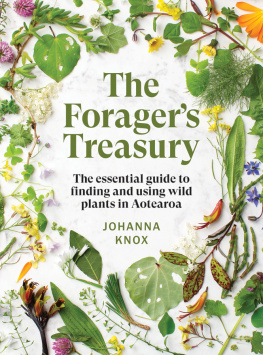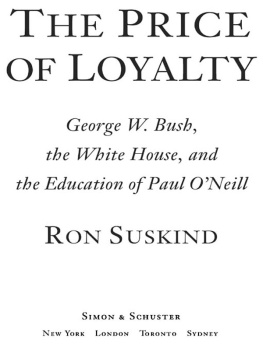This history of the New Zealand Treasury, a department of government founded in 1840, was commissioned by the Treasury and researched and written under the auspices of the Ministry for Culture and Heritages History Group.
The task of writing the first-ever history of such an important department was an exciting and stimulating one. I hope some of that excitement comes through in the text.
The archives disclosed a story of Treasury activity in the 1920s that has largely been forgotten since. And for the post-war decades, the interviews I conducted with officials and politicians put flesh and blood on what could too readily have become a dry-as-dust narrative.
But the task was also daunting. The massive documentation generated by the departments activities over 160 years could only be sampled. I followed two principal themes: those of Treasury control of the governments finances and of economic management. Many other areas of Treasury activity day- to-day payroll tasks, aspects of its internal life, its role in external economic policy await further study.
Closer to the present there were other challenges. Treasuries have long enjoyed an almost inbuilt unpopularity, but in the 1980s and 1990s controversy over the departments ideas, preferred policies and influence reached unprecedented levels. Many formidable individuals who had devoted much thought, energy and penmanship to the controversy were not only still living, but mostly still living in Wellington. Complementary to their recollections, though rarely invoked by them, there was a documentary record even more massive than that for earlier decades, but no more able to be other than selectively explored in the time available.
If I nonetheless got to the end it was not without accumulating a weighty set of debts which it is a pleasure to acknowledge. That acknowledgement must go in the first instance to Alan Bollard, Secretary to the Treasury from 1998 to 2002, for commissioning this history, for supporting the project once it was under way, and for engaging in many discussions with the author about it. His successor, John Whitehead, maintained that commitment. Treasurys deputy secretaries, all very busy individuals, read and commented on drafts of the later chapters. Both they and the Secretary did so in a spirit of full respect for the writers intellectual independence.
Many other individuals at Treasury gave a great deal of assistance to the writer. Roger Hurnard read a large part of the manuscript, and both he and Bob Buckle answered, patiently and with good humour, a great many questions of the kind that non-officials put to officials and non-economists to economists. Jean Fraser tracked down a number of photographs for me. Information services staff, notably Helen Vaughan-Dawkes, Brad Cook, Jo Harris, Sanjay Pasupuleti and Raewyn Peters, dealt with my many requests very helpfully. Communications staff Sian Robyns, Rowan Macrae, and Elisa Eckford and the current team, looked after me in the fashion for which they are renowned.
Successive Chief Historians Claudia Orange, Jock Phillips and Bronwyn Dalley oversaw the project at the Ministry for Culture and Heritage. Jock in particular, whose tenure of the office accounted for most of the duration of the project, offered valuable advice on the draft chapters, all of which he read. Martin Matthews, CEO of the Ministry, and with past experience at the Audit Office, also frequently discussed the project with the writer, and made many acute observations . Gavin McLean, the supervising historian for the project, kept a friendly and watchful eye on it and the author from across the corridor, and also brought his lengthy publishing experience very helpfully to bear. David Green carried out a characteristic, but no less remarkable for that, scrupulous and intelligent editing of the text. Pam Ward and Fran McGowan went beyond the call of duty in dealing with many interloan requests. Sherryl Allen did a great deal of the photograph research, including the often tedious task of securing permissions, whilst Emma Dewson checked many references. Kathryn Hastings, Pauline Hoy and Gwen Calnon were all successively indispensable. I could have done without neither Megan Hutchings expertise in oral history and common sense in life, nor Ian McGibbons collegiality. Fellow contract historians Neill Atkinson, Susan Butterworth, Alan Henderson, Margaret McClure, John E. Martin and David Young writing about other government departments made many helpful suggestions. Simon Cauchi prepared the index.
Four individuals Brian Easton, Harvey Franklin, Gary Hawke, and John Martin read drafts of the entire manuscript. Their often vigorous comments, queries and suggestions immensely improved the text. The many one-on-one discussions I had with them were one of the real bonuses of the project for me. It is difficult to exaggerate how crucial these exchanges were, and the four of them are for that reason all the more exempt from any responsibility for the remaining faults in the book. As are a number of other individuals Harry Broad, Peter Coleman, Peter Hall and Stevan Eldred-Grigg unlucky enough to be ( perhaps have been) the writers friends, who volunteered to read all or parts of the manuscript and, not content with that effort, took time to make helpful comments and suggestions.
Those whom I interviewed deserve special thanks for the unfailing courtesy and kindness which they (and in some instances their spouses) displayed to the writer, and, especially if met with in the first days of the project, their tactful seeming obliviousness to the naivety of many of his questions. A large number of other individuals contributed information and comment, amongst them Robin Andrew, Geoff Bertram, Jonathan Boston, Ralph Chapman, Margaret Clark, Philip Colquhoun, Peter Fraser, Don Gray, Hauraki Greenland, Bob Gregory, Terence Hayden, Anthony Hubbard, Paul Jones, David King, Tony Nightingale , Roger Procter, Grant Scobie, Anne Scoular, David Skilling, Brian Smith, David Smyth, Geoff Swier, Fred Watson, David White and Charlotte Williams.
Some of those comments were made in response to papers I presented on aspects of the Treasurys history to the New Zealand Historical Associations 2001 conference, to the School of History, Philosophy and Politics at Massey University , to the staff of the Alexander Turnbull Library, in the History Groups public seminar series, in a series of in-house Treasury seminars, and to Victoria University of Wellingtons Stout Research Centre and its interdisciplinary seminar convened by Bob Tristram. I wish in particular to acknowledge Bob, whose record of promoting the exchange of ideas in a scholarly environment is second to none.
The list of important sources which I have overlooked is undoubtedly lengthy, but was shortened by the steers provided me by a number of individuals James Belich, Mary Boyd, Ashley Gould, Gwenda Jensen, Julie Keenan, Ted Lundy and Phil Parkinson to specific records, theses, articles, books or journals.
Staff at Archives New Zealand, the Alexander Turnbull Library, the National Library, the Hocken Library, the Parliamentary Library, and Rosemary Collier at the Bank of New Zealand Archive, all provided helpful and intelligent guidance to the records and sources within their domain. Like so many other writers it is a particular pleasure to acknowledge the indispensable assistance of Joan McCracken and the staff at Turnbull Library Pictures. Linda Evans and Jocelyn Chalmers at the Turnbulls Oral History Centre regularly bailed me out of many a tape recorder near-debacle.
I am indebted to Barry Ashwin for permission to see and cite from material in his possession; to the Chief Librarian, Alexander Turnbull Library, for permission to consult the Marshall Papers; to both the Chief Librarian, Alexander Turnbull Library and Frank Corner for permission to cite from material in the McIntosh Papers; to the Chief Archivist, Archives New Zealand and the leader of the National Party for permission to consult the Muldoon Papers.

